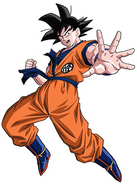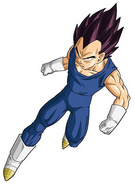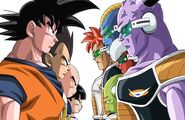No edit summary Tag: rte-source |
No edit summary Tag: rte-source |
||
| Line 5: | Line 5: | ||
==Overview== |
==Overview== |
||
| − | [[File:FunanimatoinLOG.png|thumb|left|220px| |
+ | [[File:FunanimatoinLOG.png|thumb|left|220px|Funimation Productions, Ltd. logo (1994-2005)]] |
Funimation rose to prominence by acquiring the rights to ''[[Dragon Ball (anime)|Dragon Ball]]'' (licensed early to mid 1990s), ''[[Dragon Ball Z]]'' (licensed in the early to mid 1990s) and ''[[Dragon Ball GT]]'' (licensed between 2003–2004). By 1998, they were able to get widespread television exposure via Cartoon Network's [[Toonami]] block, and the ''[[Dragon Ball (franchise)|Dragon Ball]]'' phenomenon quickly grew in the United States as it had elsewhere. (Two previous attempts by Funimation to release ''Dragon Ball'' to network television had previously been canceled, before the series and the company found success on Cartoon Network.) In the UK, ''Dragon Ball'', ''Dragon Ball Z'' and ''Dragon Ball GT'' ran on a twined channel called Toonami, a channel that aired many anime shows as well as a few American cartoons. |
Funimation rose to prominence by acquiring the rights to ''[[Dragon Ball (anime)|Dragon Ball]]'' (licensed early to mid 1990s), ''[[Dragon Ball Z]]'' (licensed in the early to mid 1990s) and ''[[Dragon Ball GT]]'' (licensed between 2003–2004). By 1998, they were able to get widespread television exposure via Cartoon Network's [[Toonami]] block, and the ''[[Dragon Ball (franchise)|Dragon Ball]]'' phenomenon quickly grew in the United States as it had elsewhere. (Two previous attempts by Funimation to release ''Dragon Ball'' to network television had previously been canceled, before the series and the company found success on Cartoon Network.) In the UK, ''Dragon Ball'', ''Dragon Ball Z'' and ''Dragon Ball GT'' ran on a twined channel called Toonami, a channel that aired many anime shows as well as a few American cartoons. |
||
| Line 23: | Line 23: | ||
*''[[Dragon Ball GT]]'' |
*''[[Dragon Ball GT]]'' |
||
*''[[Dragon Ball Z Kai]]'' |
*''[[Dragon Ball Z Kai]]'' |
||
| + | *''[[Dragon Ball Super (anime)|Dragon Ball Super]]'' |
||
*''[[w:c:fairytail:|Fairy Tail]]'' |
*''[[w:c:fairytail:|Fairy Tail]]'' |
||
*''[[w:c:fruitsbasket:|Fruits Basket]]'' |
*''[[w:c:fruitsbasket:|Fruits Basket]]'' |
||
Revision as of 02:33, 9 December 2016

Funimation's current logo (2016-present)
Funimation (previously known as Funimation Productions and Funimation Entertainment, sometimes stylized as FUNimation) is an American entertainment company formed by Gen Fukunaga on May 9, 1994 to produce, merchandise and distribute anime and other entertainment properties in the United States and international markets. The company is headquartered and based in Flower Mound, Texas.
The company became a subsidiary of Navarre Corporation on May 11, 2005 only to be sold back to Fukunaga in April 2011.
Overview

Funimation Productions, Ltd. logo (1994-2005)
Funimation rose to prominence by acquiring the rights to Dragon Ball (licensed early to mid 1990s), Dragon Ball Z (licensed in the early to mid 1990s) and Dragon Ball GT (licensed between 2003–2004). By 1998, they were able to get widespread television exposure via Cartoon Network's Toonami block, and the Dragon Ball phenomenon quickly grew in the United States as it had elsewhere. (Two previous attempts by Funimation to release Dragon Ball to network television had previously been canceled, before the series and the company found success on Cartoon Network.) In the UK, Dragon Ball, Dragon Ball Z and Dragon Ball GT ran on a twined channel called Toonami, a channel that aired many anime shows as well as a few American cartoons.

Funimation's previous logo, under Navarre ownership (2005-2011)

Funimation's former logo (2011-2016)
From 1995 to 1998, all their Dragon Ball and Dragon Ball Z dubs used a different Canadian voice cast. The episodes and movies dubbed by Canada's Ocean Productions for Funimation are known as the Ocean dub. The episodes dubbed by Funimation's in-house talents are known as the FUNimation dub.
Funimation was often criticized for their heavy localization of the series, which included censorship, replacing the soundtrack and name changes, although in more recent years they have stopped such practices.
Now licensed by Funimation
- Black Butler
- Casshern Sins
- Deadman Wonderland
- Detective Conan
- Dragon Ball
- Dragon Ball Z
- Dragon Ball GT
- Dragon Ball Z Kai
- Dragon Ball Super
- Fairy Tail
- Fruits Basket
- Fullmetal Alchemist
- Fullmetal Alchemist Brotherhood
- Kenichi: The Mightiest Disciple
- Kodocha
- One Piece
- Ouran High School Host Club
- Rebuild of Evangelion
- Samurai Champloo
- Sekirei
- Shin Chan
- Soul Eater
- Slayers
- Slayers Next
- Slayers Try
- Trigun
- Trinity Blood
- Tsubasa: Reservoir Chronicle
- YuYu Hakusho
- xxxHolic



